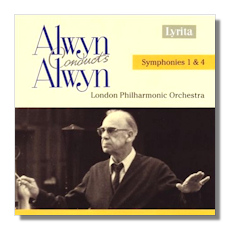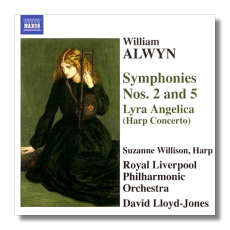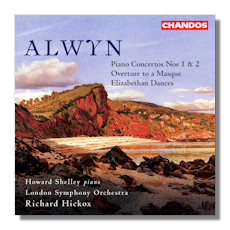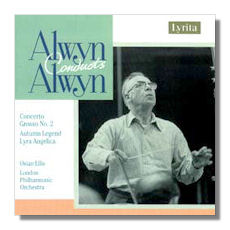
The Internet's Premier Classical Music Source
Related Links
-
Find CDs & Downloads
Amazon - UK - Germany - Canada - France - Japan
ArkivMusic - CD Universe
Find DVDs & Blu-ray
Amazon - UK - Germany - Canada - France - Japan
ArkivMusic-Video Universe
Find Scores & Sheet Music
Sheet Music Plus -
Recommended Links
Site News
William Alwyn
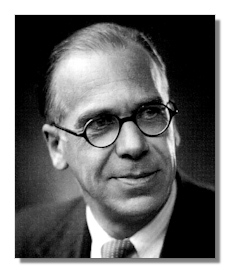
(1905 - 1985)
British composer William Alwyn (November 7, 1905 - September 11, 1985), born William Alwyn Smith, is what baseball fans like to call a "pheenom". He not only wrote music, he wrote poetry, translated French poetry, and painted, all at a highly impressive level. And he played the flute professionally, joining the London Symphony Orchestra in his twenties. Furthermore, he was a bit of a prodigy. At the age of 15, he entered the Royal Academy of Music. At 21, he became a professor of composition at the very same place.
Alwyn composed at a fairly respectable pace. In the Forties and Fifties, he provided scores for films (Odd Man Out, The Winslow Boy, The Rocking Horse Winner among many, many others) and incidental music for the BBC and for Disney (both films and television). This led him to dissatisfaction with everything he had written before 1940, and he rejected it in favor of a fresh start. As we have begun to find out through the efforts of the William Alwyn Society, it's a good thing he didn't actually destroy these early scores, some of which, like the Piano Concerto #1, are quite fine. Alwyn reacted to his self-assessed "woeful lack of technique" by concentrating on a Waltonian neo-classicism, à la that composer's Sinfonia concertante, and counterpoint. By the late Forties, however, Alwyn felt sufficiently capable to allow neo-Romantic elements into his music. The Piano Concerto #2 (1960), for example, sings as passionately as Sergei Rachmaninoff. With the patronage of the conductor John Barbirolli, Alwyn began a series of four symphonies (1949, 1953, 1956, 1959) – four different approaches to symphonic form conceived, according to the composer, at one go. One final symphony followed, the Fifth, subtitled "Hydriotaphia" and inspired by the prose of Sir Thomas Browne, in 1973.
The Fifties (notably the Symphony #3, the String Trio, and the Derby Day Overture) saw Alwyn's awakening interest in dodecaphony, although typically he approached the technique with the object of reconciling it with traditional tonality. This interest increased in the Sixties with works like his opera Miss Julie (1977), a work that draws from several currents of Modern music – neo-Romanticism, Impressionism, Bergian Expressionism, neoclassicism, and dodecaphony. An opera with great tunes and a drama dynamo (Alwyn furnished his own libretto), it had to wait twenty years for its first staging in 1997.
Alwyn retired from teaching and various organizational posts in the Sixties to devote himself to composition, writing, and painting. In 1962, he sold his fabulous collection of Pre-Raphaelite paintings, bought, of course, when that group was scorned. Alwyn, in a non-demonstrative way, kept a lively independence of mind. What with changes in postwar musical fashion, his scores were considered old-fashioned, although he always had high-profile champions and recording companies interested in his work. In the scarcity of live performances, I suspect most of us made our acquaintance with his music through recording. With the rise of the mainly retrospective outlook toward the Twentieth Century, especially neo-Romantics, Alwyn has reaped the benefits. Obscure parts of his catalogue, including his film music, are being explored, and at least three labels have issued a complete cycle of his symphonies. ~ Steve Schwartz
Recommended Recordings
Symphonies
- Symphonies #1-5, Sinfonietta/Chandos CHAN9429
-
Richard Hickox/London Symphony Orchestra
Amazon - UK - Germany - Canada - France - Japan - ArkivMusic - CD Universe
Or Available Individually
Symphony #1, Piano Concerto #1 - Chandos CHAN9155
Amazon - UK - Germany - Canada - France - Japan - ArkivMusic - CD Universe
Symphony #2, Fanfare for a Joyful Occasion, Overture "Derby Day", Overture to a Masque, "The Magic Island" - Chandos CHAN9093
Amazon - UK - Germany - Canada - France - Japan - ArkivMusic - CD Universe
Symphony #3, Violin Concerto - Chandos CHAN9187
Amazon - UK - Germany - Canada - France - Japan - ArkivMusic - CD Universe
Symphony #4, Elizabethan Dances, Festival March - Chandos CHAN8902
Amazon - UK - Germany - Canada - France - Japan - ArkivMusic - CD Universe
Symphony #5 "Hydriotaphia", Piano Concerto #2, Sinfonietta - Chandos CHAN9196
Amazon - UK - Germany - Canada - France - Japan - ArkivMusic - CD Universe - Symphonies #1 & 4/Lyrita SRCD.227
-
William Alwyn/London Philharmonic Orchestra
- Symphonies #2, 3 & 5 "Hydriotaphia"/Lyrita SRCD.228
-
William Alwyn/London Philharmonic Orchestra
- Symphonies #1 & 3/Naxos 8.557648
-
David Lloyd-Jones/Royal Liverpool Philharmonic Orchestra
- Symphonies #2 & 5 "Hydriotaphia"; Lyra Angelica/Naxos 8.557647
-
David Lloyd-Jones/Royal Liverpool Philharmonic Orchestra
- Symphony #4, Sinfonietta/Naxos 8.557649
-
David Lloyd-Jones/Royal Liverpool Philharmonic Orchestra
- Symphonies #1 & 2 (rec. 1952/53)/Dutton CDSJB1029
-
John Barbirolli/BBC Symphony Orchestra
Concertos
- Piano Concertos #1 & 2; Overture to a Masque, Elizabethan Dances/Chandos CHAN9935
-
Howard Shelley (piano), Richard Hickox/London Symphony Orchestra
- Piano Concertos #1 & 2; Derby Day, Sonata alla Toccata/Naxos 8.557590
-
Peter Donohoe (piano), James Judd/Bournemouth Symphony Orchestra
- Lyra Angelica for Harp, Autumn Legend for English Horn, Pastoral Fantasia for Viola, Tragic Interlude for 2 Horns & Strings/Chandos CHAN9065
-
Rachel Masters (harp), Nicholas Daniel (English horn), Stephen Tees (viola), Richard Hickox/City of London Sinfonia
- Lyra Angelica for Harp, Autumn Legend for English Horn, Concerto Grosso #2/Lyrita SRCD.230
-
Osian Ellis (harp), Geoffrey Browne (English horn), William Alwyn/London Philharmonic Orchestra
- Lyra Angelica for Harp & Strings; Symphonies #2 & 5/Naxos 8.557647
-
David Lloyd-Jones/Royal Liverpool Philharmonic Orchestra
- Concerto for Oboe, Harp and Strings; Concerti Grossi/Chandos CHAN8866
-
Nicholas Daniel (oboe), Rachel Masters (harp), Richard Hickox/City of London Sinfonia
- Violin Concerto; Symphony #3/Chandos CHAN9187
-
Lydia Mordkovitch (violin), Richard Hickox/London Symphony Orchestra















